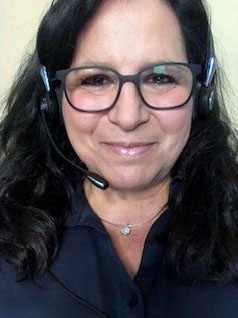New service provides support for conflicts at work
ETH Zurich has revised its regulations regarding procedures for inappropriate behaviour and conflicts in the workplace. The new Clarification Office, established on 1 July 2024, complements existing support services for employees. Nadia Dörflinger-Khashman was interviewed about ETH’s contact and advice services and explained what has changed.

Nadia Dörflinger-Khashman, we’ve certainly all experienced conflicts within a team, among colleagues or with our superiors. Why is it so important to address and resolve conflicts?
Nadia Dörflinger-Khashman: Constructive controversy is essential for innovation and progress. However, if differences of opinion are dealt with unfairly, or if people are belittled or put under undue pressure, the effects are not only negative for the individual, but often also for the whole team or research group. That’s why it is important to look into ongoing interpersonal friction as early as possible and to try to resolve the situation. This will free up resources like energy and attention for the team’s actual tasks and goals.
The regulations now distinguish between conflicts and inappropriate behaviour. Why make this distinction? And what exactly does ETH Zurich define as inappropriate behaviour?
Let me start with the second question. ETH has defined its understanding of inappropriate behaviour in the Code of Conduct “Respect”: sexual harassment, discrimination, racism and bullying are not tolerated.
When deciding on a course of action, it is important to distinguish between conflicts and inappropriate behaviour. Take the example of two people working together on a project. Both have different communication and working styles, which lead to misunderstandings and tensions. This would be a typical conflict situation. If, on the other hand, one of these two people belittles the other because of their gender or background, this would be considered inappropriate behaviour. When it comes to conflicts, you can try to resolve them together and on an equal footing. Inappropriate behaviour, however – in our example, discrimination – is not a conflict, but an undesirable transgression of boundaries, a no-go.
What does this mean for affected individuals? Do they have to follow different procedures?
For affected individuals or people seeking advice, it makes no difference at first. Both the Respect and the Clarification Offices will support them in categorising their specific issue and then show them possible courses of action.
There are a number of contact and advice services at ETH Zurich for individuals in difficult situations. Why was the Clarification Office established?
The Clarification Office provides support for ETH Zurich employees who want to actively resolve a situation with the parties involved and who would like professional support during this process. The experts at the Clarification Office are highly experienced in conflict management and familiar with the particularities of science and research as well as administrative roles. This can be a great relief for people affected by workplace conflict, as they do not have to worry about how to proceed in such cases. The Clarification Office also provides superiors with low-barrier support for recognising potential conflicts within their teams at an early stage, figuring out what kind of conflict situation they are dealing with and taking appropriate steps to resolve it or obtain support if necessary.
The Respect Office has a policy of strict confidentiality for people seeking advice. How about the Clarification Office?
To resolve a conflict between colleagues, it is necessary to lift confidentiality to a certain extent – otherwise, no clarification of the situation can take place. It is important to know that the Clarification Office always conducts a confidential preliminary meeting with the person who is seeking advice and resolution. During this meeting, the Clarification Office explains the next steps and discusses whether the person would like to proceed – and if so, how.
What happens next?
If the person who contacted the Clarification Office agrees to the procedure, the office will inform the other party about the request to resolve a specific situation. It may be useful to involve additional parties, such as the team, the superior or Human Resources. Confidentiality will only be lifted to the extent needed to resolve the situation as effectively and expediently as possible and to reach a mutual agreement. The Clarification Office works on a "conditionally confidential" basis with the aim of finding a resolution.
Speaking of confidentiality, how does the External Reporting Office handle this?
The Reporting Office gathers facts about reports of sexual harassment and systematic discrimination and determines whether or to what extent a violation of the Code of Conduct “Respect” has occurred. Since the office must view the situation impartially and without constraints, it must be able to speak with anyone who is accused or otherwise involved. It is therefore necessary to disclose names. However, the preliminary meeting is confidential. After that, the individual decides whether the Reporting Office should initiate a formal fact-finding process.
In the past, it was possible to report bullying directly to the Reporting Office. Why was this changed?
The feeling of being bullied is stressful. However, various legal criteria must be met for the offence of bullying to be established, for example, to allow for thorough fact finding in a team, to involve a larger circle of individuals or to commission an expert opinion. We therefore have to distinguish between whether someone feels they are being bullied or whether the nature of the working relationship meets the legal criteria for bullying. This requires different approaches for each case. The new Clarification Office assists in assessing the situation and the context and in evaluating the bullying allegations. If the case meets the legal criteria, the Clarification Office will refer the individual in question to the Reporting Office. Up to that point, we do not refer to bullying, but rather to bullying allegations or an escalated workplace conflict.
You sometimes talk about "clarifications" rather than "solutions". Can you explain why?
We have chosen to use realistic vocabulary. We have to be aware that not every situation or conflict can be resolved. However, it is often possible to iron out certain aspects. Sometimes a situation has to be clarified before it can be resolved. The best-case scenario is that our contact and advice services can help affected individuals continue their work at ETH with ease and enthusiasm.
Do the ETH contact and advice services also conduct investigations?
No. The contact and advice services act as information providers and mediators. They advise affected individuals on the resources and options available to them in their particular case. The aim is to support them in taking steps towards changing their situation. The External Reporting Office also does not conduct investigations, but rather a formalised fact-finding procedure that is impartial to all parties.
Does this mean that these services are not authorised to implement measures or impose penalties?
No, they are not legally authorised to do so. However, they can make recommendations to decision-makers such as superiors or the Executive Board. In most cases, these recommendations are taken seriously and implemented.
Please clarify one more thing: where exactly can members of ETH Zurich turn in the event of assault, threats, stalking or violence?
That is an important question. If this occurs in the context of ETH Zurich, the Safety, Security, Health and Environment unit will help, namely a member of the Security and Emergency Management team. They are trained in threat management. If a situation is acute and on-site help is needed, the ETH Emergency Desk can be reached 24/7. If necessary, they will also call the police. Of course, you can also contact the police or another emergency service directly in case of emergency. However, it is essential that the ETH Emergency Desk is informed afterwards. They will guide the police or emergency services through ETH's complex building structures so that help can reach the affected individuals as quickly as possible. The contacts and procedures can be found on Staffnet.
Is the anonymous reporting form still available?
Absolutely. But please note that an anonymous report cannot be used to receive support or clarify a situation, nor can it be used to accuse anyone. However, anonymous reports can be used to provide ETH with important information for continuous improvement.
What advice would you give to individuals affected by inappropriate behaviour or workplace conflicts?
Get support and get in touch! No matter what your case is about, the contact and advice services are available to assist you. In case of doubt, please feel free to contact the Respect Office.

Nadia Dörflinger-Khashman heads the Diversity and Collaboration unit in the Vice-Presidency for Personnel Development and Leadership. In collaboration with her team, she has further developed ETH Zurich's respect and conflict management system, taking into account comprehensive feedback from various parts of the university. In May 2024, the Executive Board approved the revised regulations.
The changes in brief
ETH Zurich is committed to providing improved support for its employees in the event of conflicts or inappropriate behaviour at the workplace. To this end, the existing structures and processes have been revised, and preventative measures have been strengthened. The regulations now distinguish between three main services for employees:
- The Respect Office offers guidance on where ETH members can best direct their questions. Short-term coaching is also offered to individuals seeking advice. Counselling is confidential.
- The new Clarification Office provides advice and support for easing tensions and conflicts in the workplace. Managers can also contact the Clarification Office for help with prevention measures and the early detection of escalation potential.
- The External Reporting Office conducts a formal fact-finding process based on a written report of discrimination or sexual harassment.
The revised regulations were implemented on 1 July 2024 under the expanded title “Regulations for members of ETH Zurich regarding concerns about and reporting of inappropriate behaviour and conflicts in the workplace”.
Support when faced with inappropriate behaviour or conflict
Please find all information and contacts on Staffnet.
Always up to date
Would you like to always receive the most important internal information and news from ETH Zurich? Then subscribe to the "internal news" newsletter and visit Staffnet, the information portal for ETH employees.
Comments
No comments yet